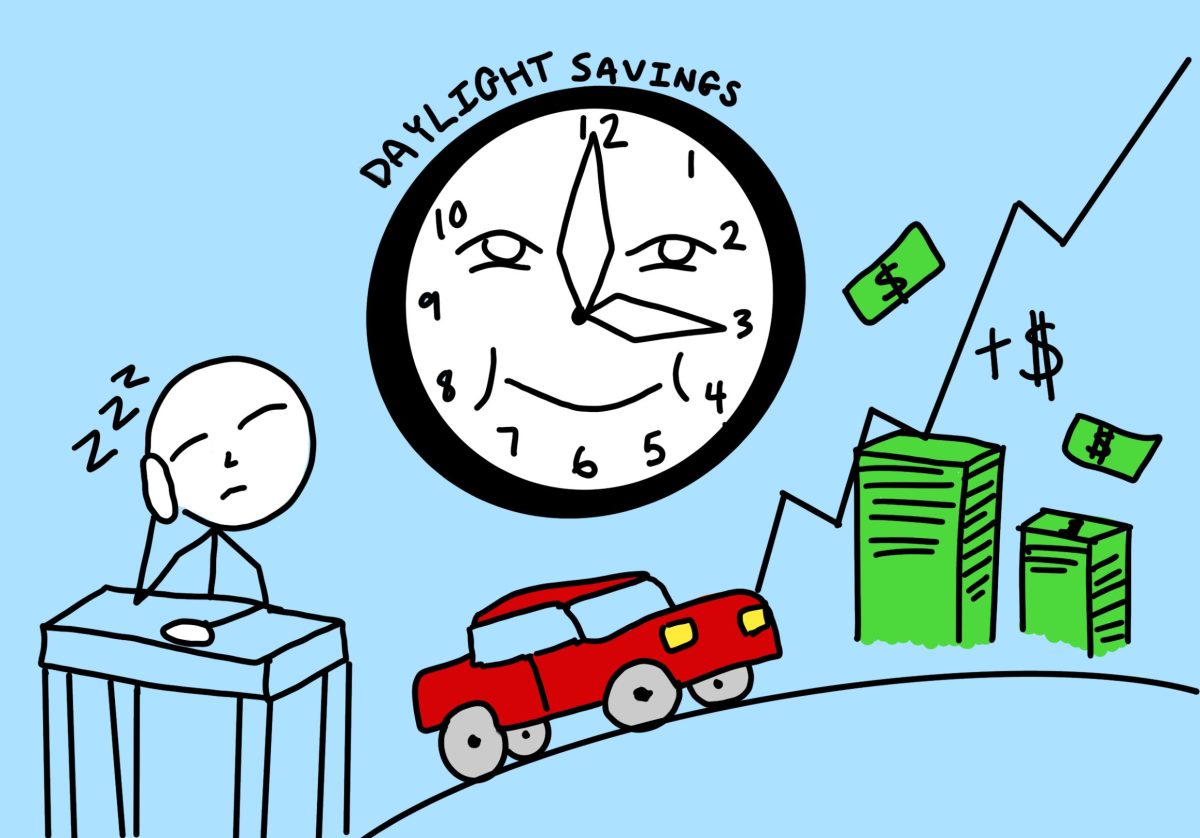Though critics argue that daylight saving harms students’ health and makes them more tired, proponents say that it actually pushes students to be more productive by giving them more time.
Is Daylight Savings Truly Necessary?
November 17, 2023
Daylight Saving Time is Ruinous to Our Wellbeing
Twice a year, clocks around the country are adjusted for daylight saving time (DST), an antiquated system predicated upon the notion that reducing the amount of time spent in bed is somehow conducive to energy conservation and worker efficiency.
States should consider adopting a permanent standard time to synchronize body clocks with sunrise and sunset instead of forcing people to alter their schedules biannually.
Daylight saving time disrupts circadian rhythms, which modulate sleep cycles and physical, mental, and behavioral changes within the human body. Even a slight time difference can cause individuals’ body clocks to change significantly, giving rise to fatigue that begins to manifest by mid-day, according to SleepFoundation
This misalignment between the body clock and sped-up time can lead to reduced alertness, impaired concentration and diminished overall performance, ultimately impacting productivity in the school environment.
What’s more, people who incur sleep debt — the difference between how much sleep one needs and actually gets — from daylight saving time cannot easily catch up on missed sleep in the spring. It takes up to four days to recover from losing one hour of sleep, according to the National Center for Biotechnology Information.
“I do feel sleep deprivation in March with that 1 hour loss,” Senior Ashley Lee said.
Daylight saving time is also linked to the phenomenon of cyberloafing, the practice of neglecting work in favor of browsing the internet, according to the Pennsylvania State University. With the temptation of online distractions and social media just a click away, individuals may find themselves succumbing to the allure of procrastination during work hours.
In professional settings, where efficiency and timely completion of tasks are crucial, the negative effects of daylight saving are even more pronounced. Delays in completing individual tasks because of daylight savings can cause bottlenecks to form in team projects as well.
Proponents of daylight saving argue that it is an time-tested, efficient method to lower energy consumption in households, according to The Columbus Dispatch.
However, a 2008 study by the National Bureau of Economic Research revealed that daylight saving time does more harm than good when it comes to saving energy. Researchers concluded that residential demand for electricity in Indiana increased by roughly 1 percent due to daylight saving time, racking up $9 million in electricity bill costs and $1.7 to $5.5 million in pollution emission costs per annum.
An increase of 2 to 4 percent in electricity consumption rates in the fall notably coincided with the start of daylight saving time, counteracting claims that it is in any way beneficial for environmental concerns. Moreover, daylight saving time was first integrated in belligerent nations during World War I to save fuel, according to the Library of Congress. This motive no longer applies to the modern era as recent data shows that daylight saving time produces mixed results.
Clearly, daylight saving time is past its heyday; substituting it for permanent standard time — a fixed year-round time — would work wonders for people’s health. Lawmakers should listen to the recommendations of medical professionals and do away with daylight saving time once and for all.

Elizabeth Gao is a staff writer for her first year on the Portola Pilot. This is her last year at Portola, but she’s honored to be writing for the Pilot....

Marianne Chan is the Features Editor and a Business Manager for their third and final year on the Portola Pilot. Although she grumbles about wanting to...
Daylight Savings Should be a Permanent Fixture
With the times changing every March and November due to daylight savings, there is a split on whether it is really necessary. Though pulling one hour back may be difficult to adjust to because of the sudden time change, daylight savings should be kept to increase both economic and academic productivity while securing public safety.
Daylight savings should be kept as it contributes to public safety. According to University of Washington law professor Steve Calandrillo who testified on this topic in Congress, the extra hour of sunlight helps minimize vehicle accidents or other dangers on the road. By making daylight savings permanent, communities will be able to encourage the safety of loved ones.
Moreover, daylight savings can leave time for other tasks. Through the extra hour, students have more time for their tasks or assignments, according to senior Youssef Achackzad.
“It’s helpful since it gives me time to focus on other, more important things, that I wouldn’t be able to do otherwise,” Achackzad said.
Daylight savings becoming a fixture additionally boosts the economy through increased demand for services. Businesses that are hospitable—restaurants, for example—can benefit from permanent daylight saving Time as lighter hours translate into greater service demand, according to Provident National Corporation economist Kurt Rankin
However, some students argue that daylight savings is dangerous and actually decreases productivity. Having to change the clocks every few months throws off sleep schedules, making students more tired, according to freshman Irene Qi.
“I tend to procrastinate a lot, so the changing of times makes it harder for me since I’m more tired,” Qi said. “It’s more dangerous too, since I’m doing things while I’m this tired.”
Though there is an adjustment period with daylight savings, this exhaustion is not permanent. Most people are only tired for a week after daylight savings start, according to CNET. Additionally, to minimize the exhaustion from daylight savings, students can reduce light exposure from electronic devices, according to a University of California article on the importance of sleep amid daylight savings practices.
“If people are susceptible, they can have difficulties; however for the general population it takes a week or two to adjust, and some people thrive more in the morning…and some people thrive more at night,” Portola High Mental Health Specialist Gabrielle Laufty said.
Critics claim that darker evenings and lighter mornings will disrupt the body’s rhythm which, in turn, results in stress and sleep loss. However, daylight savings also promotes more active lifestyles, as people are willing to go out more when the times change again, according to Britannica.
Despite concerns about health, daylight savings is actually healthy and more productive to both students and adults by pushing them to wake up early and giving them more time to get things done. By making daylight savings permanent, the extra hour of sunlight allows for increased productivity and healthy schedules that helps everyone.

Mary Lee is a Managing Editor for her third and final year on the Portola Pilot. While immersing herself in ambient pomodoro music or playing Korean music...

Stephanie Hwang is the News Editor for her third and final year on the Portola Pilot. She hopes to finish out this year by continuing her addiction to...

